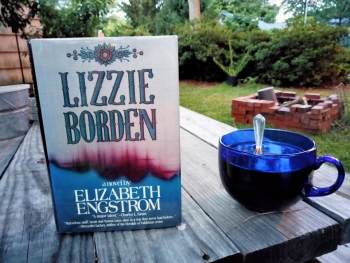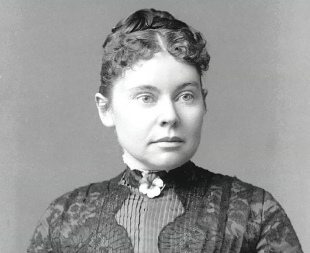I remember seeing Elizabeth Engstrom's Lizzie Borden on the shelf in the beloved Horror section of WaldenBooks. I wasn't very tempted to pick it up. This was 1991, and I was reading Skipp and Spector, Schow, Garton, Lansdale. I still read giants like King, Straub, McCammon, and Farris, but I was getting into the harder stuff. I had experienced the work of Richard Laymon and Jack Ketchum. The winds of the genre were changing, and I was happily changing with them. I wasn't even as enthusiastic about writers who were my gateways into the Horror genre, like Charles Grant, T.M. Wright, and Ramsey Campbell anymore.
I wasn't much interested in historical horror. It seemed too quaint to me. And two measly murders at the end of a novel? I wanted more.
Thankfully I came around and began enjoying subdued horror a lot more. I still like it when a writer plays hard, but I have no desire to exclusively read explicit materials. Today I have little patience for the writers who seem to wish to only gross out readers.
 Now, thirty long years later, I have read Lizzie Borden. I wonder why it took me so long. I've loved Elizabeth Engstrom's writing since I read When Darkness Loves Us around twenty years ago.
Now, thirty long years later, I have read Lizzie Borden. I wonder why it took me so long. I've loved Elizabeth Engstrom's writing since I read When Darkness Loves Us around twenty years ago.
Lizzie Borden, the novel, is a vivid depiction of a late 19th Century house in turmoil. Lizzie is a woman approaching middle age, living in an oppressive atmosphere. Her father has an unhealthy love-hate hold upon her. He is a canny businessman, but refuses to part with money to make a better life for his family. Lizzie's sister is prone to fits of hysteria and rage. The stepmother is emotionally comatose. Lizzie has urges that are considered unnatural in her time. The food is bad, the heat is brutal, there is violence in the air.
In Lizzie Borden Elizabeth Engstrom demonstrates that mental illness, eating disorders, and depression are not merely conditions of modern times. Lizzie is portayed as sympathetic and a victim of her circumstances. The real-life Borden was acquitted of her infamous accusations, and Engstrom is careful to remain ambiguous in the details. A touch of occult is hinted at, but not elaborated upon.
I learned the chant when I was growing up:
Lizzie Borden took an axe
and gave her mother forty whacks
when she saw what she had done
she gave her father forty-one
It was whispered among my playground friends that the forty-first whack was the father's you-know-what.
I knew little about Lizzie Borden than the above ditty. Elizabeth Engstrom brought the tragic person behind the rumors to life with this novel. She reportedly did extensive research for the book. It's a brilliantly-executed portrait of the devastating effects of a dysfunctional family.
Written by Mark Sieber
I wasn't much interested in historical horror. It seemed too quaint to me. And two measly murders at the end of a novel? I wanted more.
Thankfully I came around and began enjoying subdued horror a lot more. I still like it when a writer plays hard, but I have no desire to exclusively read explicit materials. Today I have little patience for the writers who seem to wish to only gross out readers.
 Now, thirty long years later, I have read Lizzie Borden. I wonder why it took me so long. I've loved Elizabeth Engstrom's writing since I read When Darkness Loves Us around twenty years ago.
Now, thirty long years later, I have read Lizzie Borden. I wonder why it took me so long. I've loved Elizabeth Engstrom's writing since I read When Darkness Loves Us around twenty years ago.Lizzie Borden, the novel, is a vivid depiction of a late 19th Century house in turmoil. Lizzie is a woman approaching middle age, living in an oppressive atmosphere. Her father has an unhealthy love-hate hold upon her. He is a canny businessman, but refuses to part with money to make a better life for his family. Lizzie's sister is prone to fits of hysteria and rage. The stepmother is emotionally comatose. Lizzie has urges that are considered unnatural in her time. The food is bad, the heat is brutal, there is violence in the air.
In Lizzie Borden Elizabeth Engstrom demonstrates that mental illness, eating disorders, and depression are not merely conditions of modern times. Lizzie is portayed as sympathetic and a victim of her circumstances. The real-life Borden was acquitted of her infamous accusations, and Engstrom is careful to remain ambiguous in the details. A touch of occult is hinted at, but not elaborated upon.

I learned the chant when I was growing up:
Lizzie Borden took an axe
and gave her mother forty whacks
when she saw what she had done
she gave her father forty-one
It was whispered among my playground friends that the forty-first whack was the father's you-know-what.
I knew little about Lizzie Borden than the above ditty. Elizabeth Engstrom brought the tragic person behind the rumors to life with this novel. She reportedly did extensive research for the book. It's a brilliantly-executed portrait of the devastating effects of a dysfunctional family.
Written by Mark Sieber
The author does not allow comments to this entry
No comments